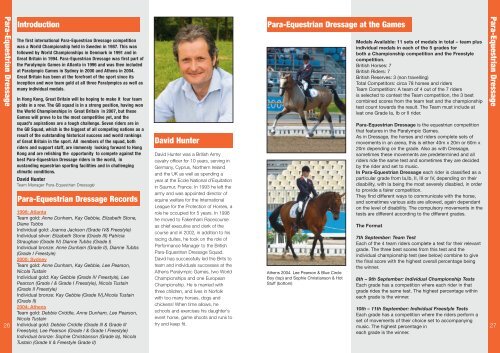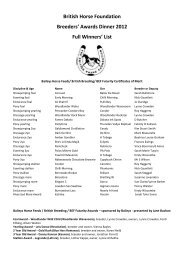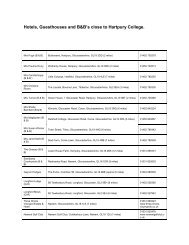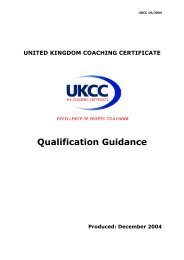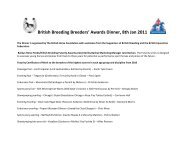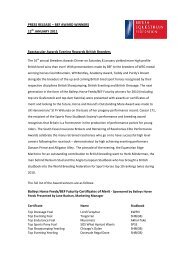Daisy Dick - British Equestrian Federation
Daisy Dick - British Equestrian Federation
Daisy Dick - British Equestrian Federation
You also want an ePaper? Increase the reach of your titles
YUMPU automatically turns print PDFs into web optimized ePapers that Google loves.
Para-<strong>Equestrian</strong> Dressage 26<br />
Introduction<br />
The first international Para-<strong>Equestrian</strong> Dressage competition<br />
was a World Championship held in Sweden in 1987. This was<br />
followed by World Championships in Denmark in 1991 and in<br />
Great Britain in 1994. Para-<strong>Equestrian</strong> Dressage was first part of<br />
the Paralympic Games in Atlanta in 1996 and was then included<br />
at Paralympic Games in Sydney in 2000 and Athens in 2004.<br />
Great Britain has been at the forefront of the sport since its<br />
inception and won team gold at all three Paralympics as well as<br />
many individual medals.<br />
In Hong Kong, Great Britain will be hoping to make it four team<br />
golds in a row. The GB squad is in a strong position, having won<br />
the World Championships in Great Britain in 2007, but these<br />
Games will prove to be the most competitive yet, and the<br />
squad's aspirations are a tough challenge. Seven riders are in<br />
the GB Squad, which is the biggest of all competing nations as a<br />
result of the outstanding historical success and world rankings<br />
of Great Britain in the sport. All members of the squad, both<br />
riders and support staff, are immensly looking forward to Hong<br />
Kong and are relishing the opportunity to compete against the<br />
best Para-<strong>Equestrian</strong> Dressage riders in the world, in<br />
oustanding equestrian sporting facilities and in challenging<br />
climatic conditions.<br />
David Hunter<br />
Team Manager Para-<strong>Equestrian</strong> Dressage<br />
Para-<strong>Equestrian</strong> Dressage Records<br />
1996: Atlanta<br />
Team gold: Anne Dunham, Kay Gebbie, Elizabeth Stone,<br />
Diane Tubbs<br />
Individual gold: Joanna Jackson (Grade IV& Freestyle)<br />
Individual silver: Elizabeth Stone (Grade III) Patricia<br />
Straughan (Grade IV) Dianne Tubbs (Grade I)<br />
Individual bronze: Anne Dunham (Grade II), Dianne Tubbs<br />
(Grade I Freestyle)<br />
2000: Sydney<br />
Team gold: Anne Dunham, Kay Gebbie, Lee Pearson,<br />
Nicola Tustain<br />
Individual gold: Kay Gebbie (Grade IV Freestyle), Lee<br />
Pearson (Grade I & Grade I Freestyle), Nicola Tustain<br />
(Grade II Freestyle)<br />
Individual bronze: Kay Gebbie (Grade IV),Nicola Tustain<br />
(Grade II)<br />
2004: Athens<br />
Team gold: Debbie Criddle, Anne Dunham, Lee Pearson,<br />
Nicola Tustain<br />
Individual gold: Debbie Criddle (Grade lll & Grade lll<br />
Freestyle); Lee Pearson (Grade l & Grade l Freestyle)<br />
Individual bronze: Sophie Christianson (Grade la), Nicola<br />
Tustain (Grade II & Freestyle Grade II)<br />
David Hunter<br />
David Hunter was a <strong>British</strong> Army<br />
cavalry officer for 10 years, serving in<br />
Germany, Cyprus, Northern Ireland<br />
and the UK as well as spending a<br />
year at the Ecole National d’Equitation<br />
in Saumur, France. In 1993 he left the<br />
army and was appointed director of<br />
equine welfare for the International<br />
League for the Protection of Horses, a<br />
role he occupied for 5 years. In 1998<br />
he moved to Fakenham Racecourse<br />
as chief executive and clerk of the<br />
course and in 2002, in addition to his<br />
racing duites, he took on the role of<br />
Performance Manager to the <strong>British</strong><br />
Para-<strong>Equestrian</strong> Dressage Squad.<br />
David has successfully led the Brits to<br />
team and individuals successes at the<br />
Athens Paralympic Games, two World<br />
Championships and one European<br />
Championship. He is married with<br />
three children, and lives in Norfolk<br />
with too many horses, dogs and<br />
chickens! When time allows, he<br />
schools and exercises his daughter's<br />
event horse, game shoots and runs to<br />
try and keep fit.<br />
Para-<strong>Equestrian</strong> Dressage at the Games<br />
Athens 2004. Lee Pearson & Blue Circle<br />
Boy (top) and Sophie Christianson & Hot<br />
Stuff (bottom)<br />
Medals Available: 11 sets of medals in total – team plus<br />
individual medals in each of the 5 grades for<br />
both a Championship competition and the Freestyle<br />
competition.<br />
<strong>British</strong> Horses: 7<br />
<strong>British</strong> Riders: 7<br />
<strong>British</strong> Reserves: 3 (non travelling)<br />
Total Competitors: circa 78 horses and riders<br />
Team Competition: A team of 4 out of the 7 riders<br />
is selected to contest the Team competition, the 3 best<br />
combined scores from the team test and the championship<br />
test count towards the result. The Team must include at<br />
leat one Grade Ia, Ib or II rider.<br />
Para-<strong>Equestrian</strong> Dressage is the equestrian competition<br />
that features in the Paralympic Games.<br />
As in Dressage, the horses and riders complete sets of<br />
movements in an arena, this is either 40m x 20m or 60m x<br />
20m depending on the grade. Also as with Dressage,<br />
sometimes these movements are predetermined and all<br />
riders ride the same test and sometimes they are decided<br />
by the rider and set to music.<br />
In Para-<strong>Equestrian</strong> Dressage each rider is classified as a<br />
particular grade from Ia,Ib, II, III or IV, depending on their<br />
disability, with Ia being the most severely disabled, in order<br />
to provide a fairer competition.<br />
They find different ways to communicate with the horse,<br />
and sometimes various aids are allowed, again dependant<br />
on the level of disability. The compulsory movements in the<br />
tests are different according to the different grades.<br />
The Format<br />
7th September: Team Test<br />
Each of the 4 team riders complete a test for their relevant<br />
grade. The three best scores from this test and the<br />
individual championship test (see below) combine to give<br />
the final score with the highest overall percentage being<br />
the winner.<br />
8th – 9th September: Individual Championship Tests<br />
Each grade has a competition where each rider in that<br />
grade rides the same test. The highest percentage within<br />
each grade is the winner.<br />
10th – 11th September: Individual Freestyle Tests<br />
Each grade has a competition where the riders perform a<br />
set of movements of their choice set to accompanying<br />
music. The highest percentage in<br />
each grade is the winner.<br />
Para-<strong>Equestrian</strong> Dressage<br />
27


